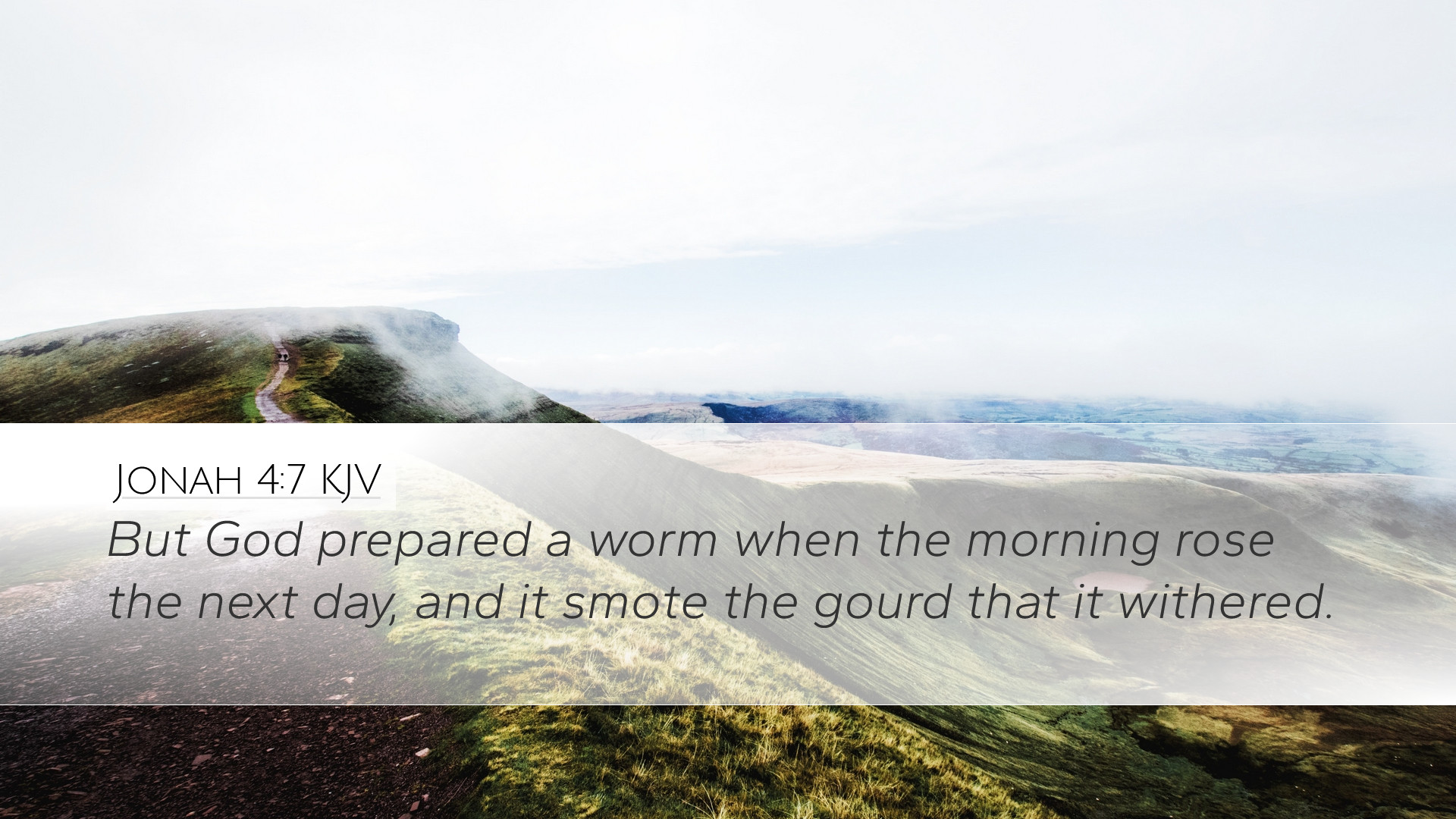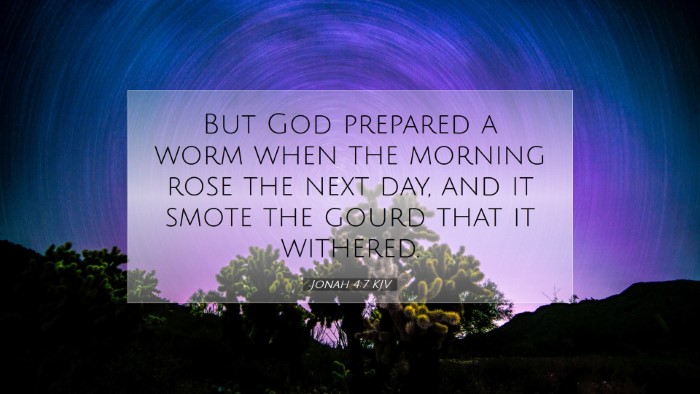Old Testament
Genesis Exodus Leviticus Numbers Deuteronomy Joshua Judges Ruth 1 Samuel 2 Samuel 1 Kings 2 Kings 1 Chronicles 2 Chronicles Ezra Nehemiah Esther Job Psalms Proverbs Ecclesiastes Song of Solomon Isaiah Jeremiah Lamentations Ezekiel Daniel Hosea Joel Amos Obadiah Jonah Micah Nahum Habakkuk Zephaniah Haggai Zechariah MalachiJonah 4:7
Jonah 4:7 KJV
But God prepared a worm when the morning rose the next day, and it smote the gourd that it withered.
Jonah 4:7 Bible Commentary
Commentary on Jonah 4:7
Jonah 4:7 presents a pivotal moment in the narrative of Jonah, where God continues to instruct and instill lessons into the heart of His reluctant prophet. In this verse, the Lord employs a striking means to illustrate His sovereignty and compassion, highlighting themes of divine providence and the significance of God's mercy towards all creation.
Text of Jonah 4:7
“But God provided a worm, which chewed the plant so that it withered.”
1. Contextual Overview
The context of this verse lies within the larger narrative of Jonah, a book that explores themes of obedience, divine mercy, and personal integrity. After Jonah's reluctant mission to Nineveh, where he preached repentance, this concluding chapter showcases his struggle with God's dealings.
2. God's Sovereignty in Provision
In this passage, we observe the concept of God's providence. Matthew Henry notes that God provided a worm to chew the gourd, which symbolizes the transient nature of earthly comforts. Henry emphasizes that God sometimes takes away our comforts to teach us lessons about dependence and reliance on Him.
2.1 The Gourd's Representation
The gourd, or plant, which God had miraculously caused to grow, represents the fleeting nature of personal satisfaction. Adam Clarke elaborates that Jonah's comfort was derived not from God's grace but from a mere plant, indicating that he placed his comfort in transient things rather than in the steadfast love of God.
2.2 The Role of the Worm
The introduction of the worm signifies God’s control over all aspects of creation. Albert Barnes interprets this as a symbol of the Lord’s ability to remove that which distracts us from divine priorities. The worm not only chews the plant but effectively illustrates how God can take away our misplaced comforts to foster growth in understanding His will.
3. Lessons of Detachment and Dependency
This verse provokes profound reflection on human dependency and the nature of attachment. The blunt removal of the gourd demonstrates God's challenge to Jonah's misplaced priorities. God asks Jonah to examine his attachment to earthly things, a theme that transcends time.
3.1 The Challenge of Comfort
Matthew Henry points out that Jonah mourned for the gourd, indicating our tendency to cling to comforts and favorable circumstances. Jonah's experience serves as a mirror for all believers regarding the fragility of earthly blessings and the necessity of an eternal perspective.
3.2 The Call to True Compassion
Jonah's anger towards the loss of the gourd starkly contrasts with God's compassion for the people of Nineveh. This juxtaposition emphasizes the call for believers to align their values with God's priorities. As Clarke notes, God desires not only the well-being of His creatures but also seeks to cultivate compassionate hearts within His followers.
4. Divine Discipline and Instruction
This episode highlights the character of God as one who lovingly disciplines His children for their growth. The relationship between God and Jonah illustrates how the Lord may use unexpected means to teach us about our vulnerabilities and divine truths.
4.1 Understanding God’s Objectives
God’s decision to use a worm, as per Barnes, implies that He knows how to reach us, sometimes through discomfort or loss. Jonah was confronted not only by the loss of a plant but also by the deeper invitation to understand God’s heart for the lost and broken.
4.2 God’s Persistent Grace
Even in discipline, God’s grace is evident. He did not abandon Jonah but sought to engage him in a lesson that would lead to greater insight and transformation. A theological takeaway here is the profound reality that God’s pursuit of His people is relentless and encompasses various means, including unexpected trials.
5. Conclusion: Reflections for the Believer
As we meditate upon Jonah 4:7, we are reminded of the intricate relationship between God's sovereignty and human emotion. Pastors, students, and theologians can draw from this text a multitude of insights about divine provision, human comfort, and the call to a broader compassion. Much like Jonah, we must grapple with the balance between our personal comforts and God’s wider redemptive plan.
- Reflection on Comfort: Are we overly attached to our comforts at the expense of God’s mission?
- Compassion Development: In what ways can we cultivate a heart that mirrors God's compassion for all people?
- Understanding Divine Discipline: Can we view our challenges as opportunities for spiritual growth and greater understanding of God’s character?
Ultimately, Jonah 4:7 challenges believers to reassess where their true contentment lies and reminds us that our comfort is always within the purview of God's greater purpose.


